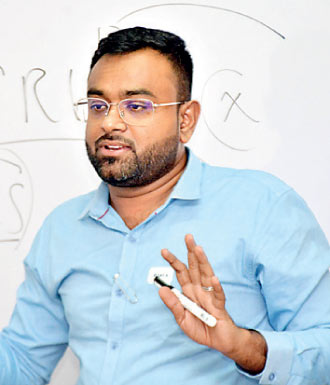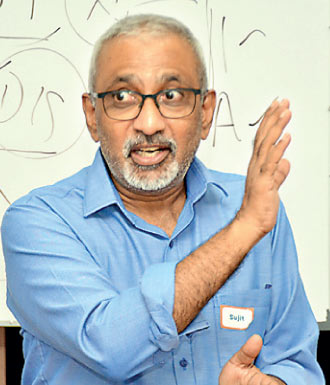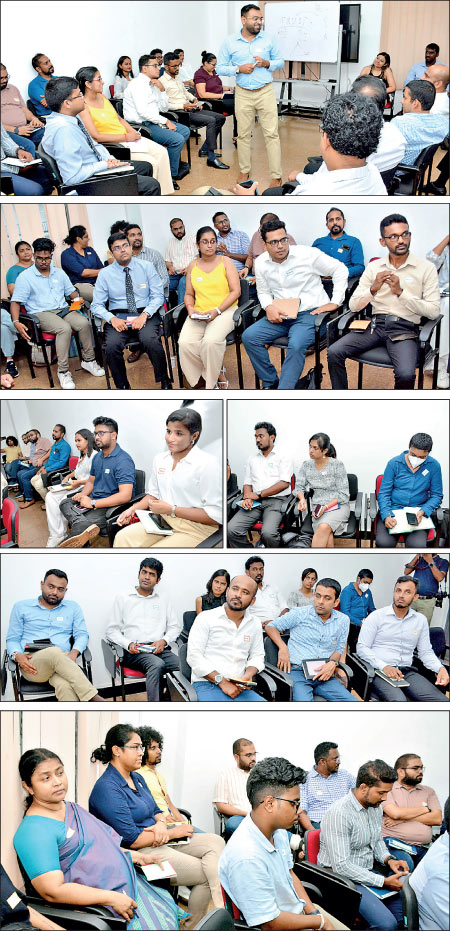Monday Feb 16, 2026
Monday Feb 16, 2026
Monday, 8 April 2024 03:10 - - {{hitsCtrl.values.hits}}

Cyber Security Advocate and Educator Asela Waidyalankara

ISC2 Colombo Chapter President Sujit Christy

Technology Law Speaker Thanuki Goonesinghe
By Divya Thotawatte
 In an attempt to increase discourse and create awareness on laws and policies that influence our use of technology, an event titled ‘Tech Circle’ was held on 21 March, encouraging conversation between experts, stakeholders, and users.
In an attempt to increase discourse and create awareness on laws and policies that influence our use of technology, an event titled ‘Tech Circle’ was held on 21 March, encouraging conversation between experts, stakeholders, and users.
The event was an initiative by Lawyer and Technology Law Speaker Thanuki Goonesinghe in collaboration with Bandaranaike Academy for Leadership and Public Policy. In prompting discussion on ‘Building Trust in Technology’ within the Tech Circle, which included industry experts, professionals, and media, Goonesinghe was also joined by Cybersecurity Advocate and Educator Asela Waidyalankara and ISC2 Colombo Chapter President Sujit Christy.
Goonesinghe started off highlighting how important it was for the public to be involved in the policymaking process which informed tech law. “Many of you know about the Online Safety Act which came about recently, and there was a lot of public uproar. But there are very little people who actually know what the Act is about, why it is not the greatest piece of legislation, or what’s good about it. I want to create a space for you to learn about it,” she said.
The Tech Circle that was held 21 March was therefore, the inaugural conversation of more to be held in the future. It would be a networking experience to build a community of people who are passionate about technology, tech policy, and law. Thereby, people could discuss and share knowledge on legislation that would affect their use of technology.
In talking about online safety and digital media, Christy spoke of misinformation and disinformation as threats to building trust in technology. He explained, “There are differences between somebody intentionally saying something or somebody saying something incorrect. There is also something I want you to refer to; misaligned information. That means you say a lot of lies but ensure there is a little truth in it. When that gets propagated, dis/misinformation is exploded. They explode in such pace, we can’t even fathom how it’s been done.” With elections to be held soon, a lot of misaligned information is sure to explode and tools such as Artificial Intelligence (AI) will be used to propagate them, he said.
Waidyalankara agreed with Christy, bringing attention to how the years from 2014 to 2024 have been the years of an explosion of the use of social media around the world. In 2020, the pandemic accentuated this reliance on technology. “This is where our current relationship with the digital came to be. We had to learn to trust. Even a Sri Lankans, we have now, more than ever, come to trust these platforms. We are probably less apprehensive doing banking in an app. We are less apprehensive doing some government services via some portal. We are more open now to do our shopping online or through social media. Our digital literacy has increased.”
But as the trust in technology is built, misinformation and disinformation tend to also spread more online. The wilful and malicious attempts to weaponise information would breach this trust. “We have now got to a point that we don’t want to trust anymore. Cyber-attacks have made sure that we don’t trust our systems anymore. If you make sure to disrupt the pillars of confidentiality, integrity, and availability, you disrupt trust.” This is where more tech discourse and awareness needed to happen.
The participating tech enthusiasts also agreed that publicising knowledge on tech policies and building a community is important to keep policymakers accountable. Despite their incompetence, law and policymakers are often not held accountable. The lack of awareness by the general public regarding tech laws and policies, and the adverse effects of those bills on their lives would further contribute to the unaccountable work by law and policymakers. “The real challenge is not in the policy formation and not in the discussion with people who are like-minded. The real challenge is in how you take it to the masses; in how you mobilize the people, how do you influence people?” a participant pointed out.
Many individuals still fear doing financial transactions such as taking loans online, but agree to social media terms and conditions that they have not understood, without hesitation. Even significant aspects of technology development like cyber-security are not entirely understood by the majority of the public, and most policies and bills are therefore also made from an ignorant or victim’s perspective, noted another participant. Therefore, it is not a question of representing the masses but of bringing the masses into the discussion to make most people who are not tech experts aware of the implications of the act of being online to be safe online.
- Pix by Upul Abayasekara -